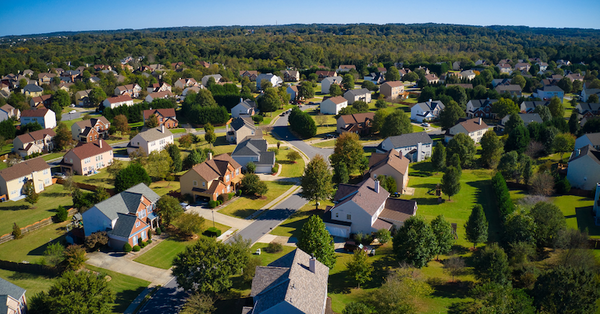If you have been looking into purchasing a home, especially in a higher-priced market, you are probably familiar with the term "jumbo loan". However, you may not exactly know what these loans are, the requirements for them, or what the limit is in the state of Georgia.
Lucky for you, we have the answers here along with everything else you need to know about jumbo loans and how they differ from conforming loan.
What's the difference between ‘jumbo’ and conventional?
The key difference between a jumbo mortgage and a conforming loan is the size of the loan. A jumbo loan is one way to buy a high-valued home or luxury home. Borrowers who obtain these loans are required to have a low debt-to-income ratio and a high credit score.
Jumbo mortgages by definition are home loans that exceed "conforming" loan limits. A conventional loan can be a "conforming" or non-conforming loan. To be a conforming loan, a conventional mortgage has to meet the loan limits spelled out by either Fannie Mae or Freddie Mac. If you’ve never heard of them, Fannie Mae and Freddie Mac are two government agencies that oversee mortgage lending.
When is a loan considered ‘jumbo’?
The Federal Housing Administration sets "conforming" loan limits and each state may have a different limit - which is largely based on home values in each location.
For 2021, the limits for non-jumbo loans are:
- $510,400 for a single-family home in most areas of the country
- $822,375 for high-cost areas, like California, where single-family home prices tend to be higher than most of the country
Why do conforming loans have limits?
The maximum limits set by the Housing and Economic Recovery Act of 2008 were meant to ensure that loans enabled by Fannie Mae or Freddie Mac would be widely available.
Jumbo loan values exceed these limits, making them nonconforming loans. Mortgage providers view nonconforming loans as riskier because Fannie Mae won’t guarantee the loans. If a borrower stops making payments and the jumbo loan defaults, lenders know they’ll be on the hook for a large sum of money.
Jumbo loan values exceed limits set by the Federal Housing Finance Agency, making them nonconforming loans.
What is the jumbo loan limit in Georgia?
As previously stated, values are different based on the state. While Georgia isn't necessarily a high priced market, convenitonal loan limits are still in place. The current limit set for a single-family unit $548,250. Any loan exceeding that value will be considered a jumbo loan mortgage and require additional qualifications.
How does a jumbo loan work?
Similar to conforming mortgages, buyers can get jumbo loans with a wide variety of terms or repayment schedules. Jumbo loans can also either feature a fixed-rate or adjustable rate.
The limit for jumbo loans are tied to local median home values. As you can imagine, if conforming loan limits are higher in higher priced area, then jumbo loan limits are going to be even higher than that. To find the jumbo loan limit for your local area, visit the Federal Housing Finance Agency's website
While the jumbo loans and conforming loans have many similarities, the biggest differences between the two are the requirements involved. Because jumbo loans exceed the conforming loan limits that are set by the Federal Housing Finance Administration, the requirements and qualifications are a lot stricter.
As far applying for jumbo loans, the process isn't much different. Most mortgage lenders offer loans beyond conforming loans and offer competitive rates. Be sure to talk to several lenders, or a broker who can inquire with multiple lenders at once to find the best possible rates.
Jumbo loan requirements and qualifications
- Credit history - To qualify for a jumbo mortgage loan, the borrower must have strong credit, which generally means a FICO score of 750 or higher. There are also income thresholds and other personal financial requirements. Most conforming loan homebuyers may be able to get away with a low credit score under 700 by making a bigger down payment, but jumbo loan homebuyers usually won’t have that same advantage.
- Financial strength - The borrower must have a debt-to-income ratio below 45% to qualify for a jumbo mortgage loan. You’ll also need to prove that you are as financially stable as you say you are. Your lender may ask for 2-3 years of tax returns, 4-6 recent paychecks, W-2 or 1099 forms, plus savings and bank account statements. Many lenders will even ask for 6 to 12 months of cash reserves. These few factors will have a major effect on the jumbo loan interest rate you receive.
- Down payment - In general, jumbo loans tend to require buyers to put down a higher down payment compared to conforming loans-typically around 20% down for single-family units. This downpayment is based on your credit score and loan amount. If you plan to purchase a second home or multi-family unit, expect to be required to put down a bit more.
- Closing Costs - In addition to a higher down payment, buyers can also expect higher closing costs. Closing costs for a single-family unit usually range between 3%-6% of the total home value. On a $500,000 mortgage, you can expect to pay $10,000 – $25,000 in cash at the closing table.
- Property appraisal - The property appraisal must support the purchase price for the home and the mortgage the borrower wants. Some lenders may even require a second appraisal.
Is a jumbo loan right for you?
If you are trying to determine if a jumbo loan is right for you, the first step is to consider what you need. Keep in mind that the conforming loan limit is $510,400- and up to $765,600 in higher cost areas. If the home or property you are looking at exceeds those limits in your area, it is a good idea to see whether or not a higher downpayment would make up the difference.
Of course, before making a decision, be sure to consider your current financials to determine whether or not you can afford to make the higher payments. If you can comfortably afford to make these higher loan payments, make sure you meet the high credit and low DTI requirement to get approved.
Jumbo loans make home ownership possible in any market, even those that are more expensive. Bottom line is that if you want to buy a home in a high-priced market, a jumbo loan is going to be your best bet.
If you plan to buy a home in Georgia with a jumbo limit loan, SimpleShowing can help. Paired with one of our experienced local agents, you are sure to find a home that works for you and your loan limit. Contact us today to get started!
Conclusion
Understanding the Georgia jumbo loan limits can be a crucial factor in your home buying process. It's important to note that these limits fluctuate annually, influenced by changes in the median home prices and FHA loan limits. Therefore, staying updated is key to making the most informed decision when securing a mortgage.
The primary residence you're looking at might fall into the conventional loan limits, or it might be in the jumbo loan range. The distinction is critical as it affects not only the jumbo loan rates but also whether you'll need to consider private mortgage insurance. Jumbo loans in Georgia are typically utilized for high-cost areas and generally have more stringent requirements when it comes to credit scores.
Finally, keep in mind that while the rates for jumbo loans might be slightly higher compared to conventional loans, they can offer substantial benefits for the right borrower. Not only can you secure a larger loan amount, but also, the investment rates might work out favorably in the long run. Take time to compare and contrast your options before making a final decision, ensuring that the loan you choose best aligns with your financial situation and home ownership goals.






